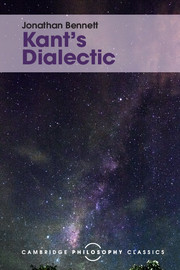Book contents
- Frontmatter
- Contents
- Preface to this edition by Karl Ameriks
- Preface
- System of references
- 1 Introduction
- 2 Concepts and intuitions
- 3 Substances and reality
- 4 The substantiality of the soul
- 5 The simplicity of the soul
- 6 The identity of the soul
- 7 Infinity
- 8 Limits
- 9 Divisibility
- 10 Freedom
- 11 God
- 12 Reason
- Index
6 - The identity of the soul
Published online by Cambridge University Press: 05 July 2016
- Frontmatter
- Contents
- Preface to this edition by Karl Ameriks
- Preface
- System of references
- 1 Introduction
- 2 Concepts and intuitions
- 3 Substances and reality
- 4 The substantiality of the soul
- 5 The simplicity of the soul
- 6 The identity of the soul
- 7 Infinity
- 8 Limits
- 9 Divisibility
- 10 Freedom
- 11 God
- 12 Reason
- Index
Summary
The third paralogism: blind alleys
The third paralogism concludes that the soul is ‘a person’. Kant normally uses the German word Person to connote freedom or moral responsibility, but that is irrelevant to the third paralogism. Its real topic is something to do with the re-identification of the soul at different times. Thus the first premiss says: ‘That which is conscious of the numerical identity of itself at different times is to that extent a person.’ (The phrase ‘to that extent’ implies that ‘personality’, whatever it is, is a matter of degree; but I cannot explain or justify that.) That identity is crucial appears earlier, when Kant sketches the paralogisms and says that the first three assert respectively that the soul ‘is substance’, that it ‘is simple’, and that ‘as regards the different times in which it exists, it is numerically identical’. In another work, Kant contrasts the morality-oriented sense of Person with a different sense in which personality ‘is merely the power of being conscious to oneself of the identity of one's existence in different circumstances’, which is clearly a pointer towards the third paralogism.
There is plenty of precedent for the assumption that the concept of a person involves knowledge of self-identity. Beck tells me that Wolff defined ‘person’ as a thing which ‘maintains a memory of itself’. Locke said that a person can ‘consider itself as itself, the same thinking thing, in different times and places’. Leibniz endorses this, not only in his replies to Locke but elsewhere as well.
The third paralogism remains unexplained. Are we to suppose that the rational psychologist claims to have proved that the soul ‘maintains a memory of itself’, and that Kant denies his right to claim this? I can make no sense of the paralogism along those lines. I shall later argue that ‘person’ is irrelevant to the serious content of the third paralogism, and that the latter's conclusion is not properly expressible by anything of the form ‘The soul is…’. (That would partly explain Kant's letting ‘person’ push its way on-stage: at least it does not push anything else off.) If that is right, we do not have to find a working role for ‘person’ in our account of the paralogism.
- Type
- Chapter
- Information
- Kant's Dialectic , pp. 94 - 114Publisher: Cambridge University PressPrint publication year: 2016

